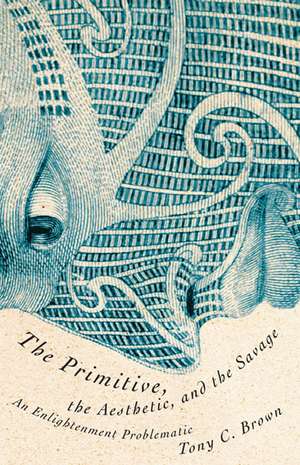The Primitive, the Aesthetic, and the Savage: An Enlightenment Problematic
Autor Tony C. Brownen Limba Engleză Paperback – dec 2012
Tony C. Brown examines “the inescapable yet infinitely troubling figure of the not-quite-nothing” in Enlightenment attempts to think about the aesthetic and the savage. The various texts Brown considers—including the writings of Addison, Rousseau, Kant, and Defoe—turn to exotic figures in order to delimit the aesthetic, and to aesthetics in order to comprehend the savage.
In his intriguing exploration Brown discovers that the primitive introduces into the aesthetic and the savage an element that proves necessary yet difficult to conceive. At its most profound, Brown explains, this element engenders a loss of confidence in one’s ability to understand the human’s relation to itself and to the world. That loss of confidence—what Brown refers to as a breach in anthropological security—traces to an inability to maintain a sense of self in the face of the New World. Demonstrating the impact of the primitive on the aesthetic and the savage, he shows how the eighteenth-century writers he focuses on struggle to define the human’s place in the world. As Brown explains, these authors go back again and again to “exotic” examples from the New World—such as Indian burial mounds and Maori tattooing practice—making them so ubiquitous that they come to underwrite, even produce, philosophy and aesthetics.
In his intriguing exploration Brown discovers that the primitive introduces into the aesthetic and the savage an element that proves necessary yet difficult to conceive. At its most profound, Brown explains, this element engenders a loss of confidence in one’s ability to understand the human’s relation to itself and to the world. That loss of confidence—what Brown refers to as a breach in anthropological security—traces to an inability to maintain a sense of self in the face of the New World. Demonstrating the impact of the primitive on the aesthetic and the savage, he shows how the eighteenth-century writers he focuses on struggle to define the human’s place in the world. As Brown explains, these authors go back again and again to “exotic” examples from the New World—such as Indian burial mounds and Maori tattooing practice—making them so ubiquitous that they come to underwrite, even produce, philosophy and aesthetics.
Preț: 218.87 lei
Nou
Puncte Express: 328
Preț estimativ în valută:
41.89€ • 43.57$ • 34.58£
41.89€ • 43.57$ • 34.58£
Carte tipărită la comandă
Livrare economică 14-28 aprilie
Preluare comenzi: 021 569.72.76
Specificații
ISBN-13: 9780816675630
ISBN-10: 0816675635
Pagini: 304
Ilustrații: 5
Dimensiuni: 140 x 216 x 38 mm
Greutate: 0.38 kg
Ediția:New.
Editura: University of Minnesota Press
Colecția Univ Of Minnesota Press
ISBN-10: 0816675635
Pagini: 304
Ilustrații: 5
Dimensiuni: 140 x 216 x 38 mm
Greutate: 0.38 kg
Ediția:New.
Editura: University of Minnesota Press
Colecția Univ Of Minnesota Press
Notă biografică
Tony C. Brown is associate professor at the University of Minnesota, Twin Cities, where he teaches eighteenth-century literature and literary theory.
Cuprins
Contents
Preface
Acknowledgments
Note on Texts and Translations
Introduction: An Enlightenment Problematic
I. Primitive, Aesthetic, Savage
1. The Primitive
2. The Aesthetic
3. The Savage
II. Delimiting the Aesthetic
4. Joseph Addison’s China
5. Kant’s Tattooed New Zealanders
III. Aesthetic Formations of History
6. Adding History to a Footprint in Robinson Crusoe
7. Indian Mounds in the End-of-the-Line Mode
Conclusion: …as if Europe Existed
Notes
Index
